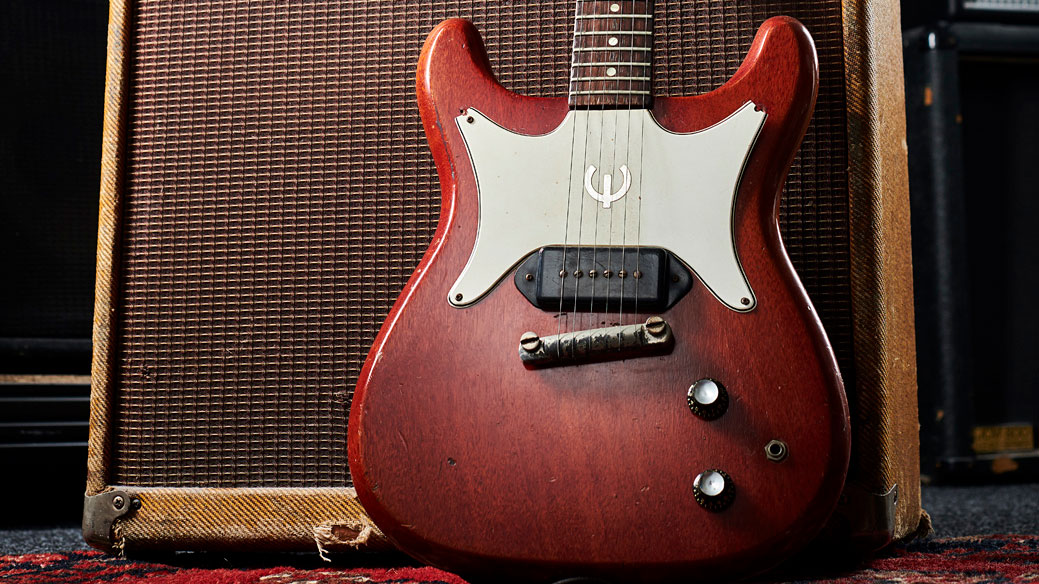Gibson responds to Satellite Amps over Epiphone Coronet dispute
Iconic US guitar manufacturer says it “must protect itself from this and other similar opportunistic tactics”

All the latest guitar news, interviews, lessons, reviews, deals and more, direct to your inbox!
You are now subscribed
Your newsletter sign-up was successful
Gibson has issued an official statement in response to claims from Satellite Amplifiers’ Adam Grimm that the guitar giant was seeking to “invalidate” his “federal trademark” for the Coronet, an electric guitar model originally made by Epiphone.
In a statement received by Guitar World, Gibson disputes Grimm’s claims, citing the launch of the Coronet in the ’50s and continued manufacture of artist models since 2008 as establishing its trademark rights.
Further, the brand accuses Satellite of intentionally profiting off Gibson’s Coronet trademark.
Gibson’s full statement reads as follows:
“Gibson has a long history with its with its well-known classic instruments. One such instrument is the Epiphone Coronet. The Epiphone Coronet was first introduced in the 1950s, which clearly established first use of the trademark. More recently, Gibson has been continuously manufacturing and providing the Epiphone Coronet for a limited number of Artists since 2008. This establishes historic (trademark) rights and continuous use (since 2008).
“As a result of creating, launching, investing, and owning the trademark for the Epiphone Coronet, Gibson simply filed to confirm their trademark ownership on a ‘first-use’ basis. The recent comments posted from the Satellite owner (Adam Grimm) confirms they (Satellite) knowingly took the name and concept from Epiphone. Brands have a right to defend themselves against this type of blatant brand misrepresentation practice, hence Gibson actions.
“Gibson did not file a lawsuit. Gibson did, understandably, file for trademark ownership and requested to cancel their (Satellite’s) mark within the USPTO as Gibson is clearly the original owner, has clear first use and thus exclusive trademark rights.
All the latest guitar news, interviews, lessons, reviews, deals and more, direct to your inbox!
“The comment posted from the Satellite owner also references a letter where they offered Gibson the opportunity to ‘buy back’ a trademark that Gibson already owns “as a measure of goodwill and good publicity.” This is confusing at best, but it speaks more to Satellite’s real intentions of profiting off of another brand’s trademark and success in the market. Gibson must protect itself from this and other similar opportunistic tactics, despite the potential distractions being created.
“Over the past year and a half, Gibson has put significant focus across all of their brands and remain proud of the progress that has been made. Epiphone has had a complete upgrade with the recent launch of the Epiphone Originals and the Epiphone ‘Inspired by Gibson’ collections. Based on heightened demand from guitarists and dealers, the Epiphone Coronet has been, and will continue to be, a key guitar in the Epiphone Originals Collection.
“Gibson has also engaged in the industry in a positive way by giving the Oberheim Synthesizer Brand back to the original founder, Tom Oberheim (for free) and by making sure the Slingerland Drum Brand found a suitable new home at DW Drums. The industry has recognized these, and other gestures, as true acts of goodwill and good intention.”

Mike has been Editor-in-Chief of GuitarWorld.com since 2019, and an offset fiend and recovering pedal addict for far longer. He has a master's degree in journalism from Cardiff University, and 15 years' experience writing and editing for guitar publications including MusicRadar, Total Guitar and Guitarist, as well as 20 years of recording and live experience in original and function bands. During his career, he has interviewed the likes of John Frusciante, Chris Cornell, Tom Morello, Matt Bellamy, Kirk Hammett, Jerry Cantrell, Joe Satriani, Tom DeLonge, Radiohead's Ed O'Brien, Polyphia, Tosin Abasi, Yvette Young and many more. His writing also appears in the The Cambridge Companion to the Electric Guitar. In his free time, you'll find him making progressive instrumental rock as Maebe.
